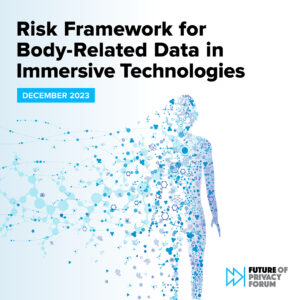Organizations are increasingly developing or deploying “immersive technologies,” a collection of hardware and software products that substitute, enhance, or alter users’ individual, physical-world experiences. These emerging technologies—which include tools like extended reality (XR), virtual worlds, and brain-computer interfaces (BCIs)—have the potential to transform healthcare, education, entertainment, advertising, and other sectors. However, because they often rely on large amounts and kinds of personal, potentially sensitive data, they also raise important privacy and data protection questions. Without safeguards, data about people’s bodies, behaviors, and surrounding environments could be inferred and used to manipulate, discriminate against, or otherwise harm both users and bystanders. FPF works with experts from industry, academia, and civil society to identify the unique privacy and data protection risks in this nascent field, analyze how existing and emerging regulations implicate immersive technologies, and develop best practices and policy recommendations.
Featured
Youth Privacy in Immersive Technologies: Regulatory Guidance, Lessons Learned, and Remaining Uncertainties
As young people adopt immersive technologies like extended reality (XR) and virtual world applications, companies are expanding their presence in digital spaces, launching brand experiences, advertisements, and digital products. While virtual worlds may in some ways resemble traditional social media and gaming experiences, they may also collect more data and raise potential manipulation risks, particularly […]






